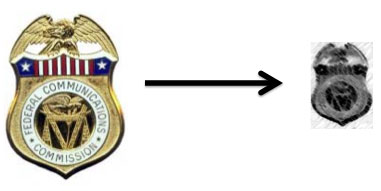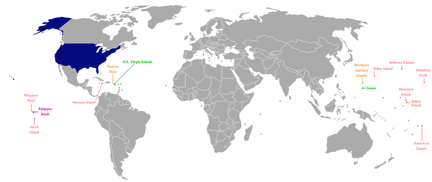Major Spectrum Enforcement Cutback Planned at FCC:
Most Industry Silent

Word leaked out last week about a major cutback in FCC spectrum enforcement that is being implemented. This cutout results from a $745,603 study FCC commissioned from Oceaneast Associates, an SBA Certified Small Disadvantaged Business and 8a Program participant. The contract was award without competition to the firm which describes itself as “management and IT consulting firm”. We have filed a FOIA request for the report (Tracking FCC-2015-000358) and will make it available here as soon as it is obtained.
While the study has not been made public, it has apparently been provided to at least one member of Congress and this is likely FOIA-able although, as previously mentioned here, FCC’s FOIA practices are less transparent than CIA’s.
Here is some information that has leaked out about the report and FCC’s plans:
- Some 160 stakeholders, including current and former EB/field staff, trade associations, government agencies, FCC advisory committees, and others, were interviewed by the consultant over a period of months - although reportedly NAB only hear about this a few days ago.
- Report concluded field staff had little consensus on their mission, except that resolving public safety interference was always Job #1. Probably true as a result of 2 decades of poor leadership, inadequate funding, and discouragement of initiative to solve problems. Actually, one way to be ready to solve public safety problems quickly is to use idle periods to solve other interference problems to improve skills and try new approaches - but that has been discouraged.
- Office closures and overall staff reductions will be balanced by increased field travel budgets, increased use of pre-positioned fixed equipment in locations where there is no field office, and establishment of a new quick-response “Tiger Team” based at Columbia. Remaining offices after cutback: NYC, Columbia MD, Atlanta, Miami, Chicago, Dallas, LA and SF. 33 agents remaining - a 50% cut
- Increased field travel funding would be about $200k annually (Is this realistic considering the need for travel to Hawaii, Alaska, Puerto Rico and USVI, not to mention Guam?)

FCC’s jurisdiction extends beyond the Beltway!
Licensed under CC BY-SA 3.0 via Wikimedia Commons
- Report found that the field is ill-equipped to monitor, identify, or locate problems related to many current or emerging RF technologies - again not a surprise considering low funding for 2 decades. Mobile DF is “becoming increasingly irrelevant” - perhaps, but works for most sources of deliberate and accidental interference.
- Procedurally, an order started circulating on the 8th floor on March 9 that would authorize an internal re-organization. The Hill has a period when they can veto such a change, but does not have to fact either way and in the past never has. Union requirements specify 30- and 120-day time periods to reach agreement on the necessary terms of the reorganization and on personnel changes. Buy-outs, early retirement offers, and possibly RIFs. The earliest this reorganization could occur is Fall 2015.
But here are some other concerns of your blogger:
- With the increased emphasis on sharing of federal spectrum by FCC licensees and new unlicensed technology, will the “powers that be” in federal spectrum management, NTIA or IRAC depending on your viewpoint, really be receptive to more sharing in view of FCC decreased resources to identify and resolve quickly any problems? What is the real impact of this bias against sharing?
- Will other federal agencies that have turned to FCC for timely interference help end up spending more for internal spectrum staffing and equipment than the money saved at FCC? Will they be as effective without the name and legal power of FCC to press compliance by people who cause interference by accident or intentionally?
- Fewer people in the field in fewer cities also decreases resource to monitor actual spectrum use in order to provide input to the policy process at FCC. While in the past many incumbents did not want such information, most recent studies, including PCAST, have surged more use of spectrum use observations in the policy process.
So far few in the regulatee community have spoke out on this issue. NAB has allegedly issued a “press statement”, but it is nowhere to be found on its voluminous website. The NAB statement is reported to have been:
"This is a potentially troubling development, particularly as the FCC begins encouraging spectrum sharing among different types of communications services. Having a robust interference enforcement presence in FCC field offices is critical to ensuring that consumers receive the services that they expect."
NAB’s endless tweets from @AirWharton have not mentioned the issue to the faithful to date. The broadcasting industry’s key mouthpiece, Broadcasting & Cable, has only mentioned the issue in passing.
CTIA is reported to be deliberating the issue this week. APCP and UTC have been silent although they should know better. Only ARRL, not always the most influential group at FCC, has issued a clear statement of concern.
We urge spectrum users to consider these issues and make their viewpoints heard at FCC on the 8th Floor and at congressional committees.
vox populi, vox dei
UPDATE
As if on queue, a few hours after this was posted NAB’s above mentioned PR man,@AirWharton, tweeted:

The link in the tweet is to http://recode.net/2015/03/17/fccs-hot-mess-of-a-database-may-not-bode-well-for-future-airwaves-sharing/, a blog post about apparent inconsistencies/errors in theFCC’s TV whitespace database that allows unlicensed sharing to TV broadcast spectrum where there are no actual TV signals present. Rather than just snipping at FCC policy, perhaps Mr. Wharton and his colleagues should ask their members whether they feel good about the pending decimation of FCC spectrum enforcement resources?
While the FCC enforcement employees involved will be affected by the change, so will a lot of other spectrum users, both federal and nonfederal, who depend on enforcement of rules and deterrence of illegal spectrum activities.
UPDATE 2 - 3/18/15
Perhaps the above update worked, perhaps something was already in progress but NAB has now ended its near silence on this issue. In an article today in Broadcasting & Cable, the key trade magazine and mouthpiece of the industry, NAB’s Dennis Wharton is quoted:
“This is a potentially troubling development, particularly as the FCC begins encouraging spectrum sharing among different types of communications services," said Dennis Wharton in response to both stories. "Having a robust interference enforcement presence in FCC field offices is critical to ensuring that consumers receive the services that they expect.”
NAB has interference concerns about the way the FCC is setting up the incentive auction repacking framework in which TV stations and wireless companies may be close neighbors on the same of adjacent channels. In addition, the FCC and the National Telecommunications & Information Administration are teaming up on a "Model City" program to test advanced spectrum sharing among different services. The administration has made it clear that advanced spectrum sharing is one way to free up more spectrum from government use. In fact, they just announced an April 15-16 joint workshop on establishing that "Model City."
Thanks to NAB for speaking out. Let’s hope CTIA, APCO, and UTC also recognize that they also have self interests here. Maybe even TIA and CEA too?



![Validate my RSS feed [Valid RSS]](valid-rss-rogers.png)

